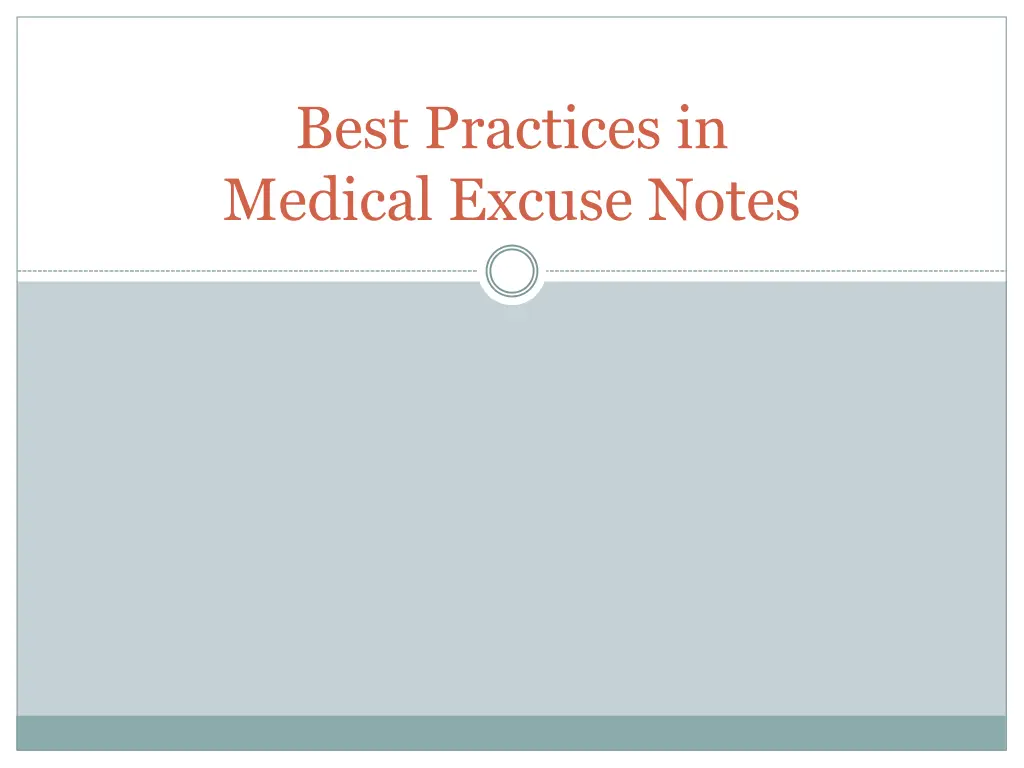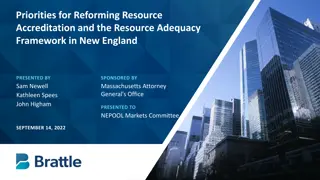
Effective Strategies for Medical Excuse Notes in Educational Institutions
Explore best practices and goals outlined by healthcare professionals and academic leaders for managing medical excuse notes in educational settings. Learn how to support students, maintain confidentiality, and balance health needs with academic success.
Download Presentation

Please find below an Image/Link to download the presentation.
The content on the website is provided AS IS for your information and personal use only. It may not be sold, licensed, or shared on other websites without obtaining consent from the author. If you encounter any issues during the download, it is possible that the publisher has removed the file from their server.
You are allowed to download the files provided on this website for personal or commercial use, subject to the condition that they are used lawfully. All files are the property of their respective owners.
The content on the website is provided AS IS for your information and personal use only. It may not be sold, licensed, or shared on other websites without obtaining consent from the author.
E N D
Presentation Transcript
Best Practices in Medical Excuse Notes
PANEL Margaret Higham MD Medical Director of Health Service Tufts University Jeff Maher MD & Julie Gray PA Medical Director and Physician Assistant Bowdoin College Ryan Travia M.ED. Associate Dean of Students for Wellness Babson College
Agenda Brainstorm guiding principles from different perspectives Describe the models from our three institutions Identify other best practices from the audience
Who are the Constituents? Health Service Counseling Services Victim Advocates and Title IX Deans Student Accessibility Office Faculty Students Athletics
GoalsHealth Service Help students develop personal agency Help students learn to balance health in the context of life Provide confidentiality Ensure adequate clinical resources for those who are truly sick not drive unnecessary volume to Health Service Have clinical staff working at their top of their skill level not rubber stamping minor illness issues There are different needs for students with short term illness, from those with chronic or longer term conditions Advocate for students who need extra support or have significant medical needs Provide faculty with targeted assistance not as a rubber stamp, but for important situations.
GoalsDeans Identify students who are struggling Help students be successful Provide confidentiality Connect students to resources such as Student Accessibility Services Help students learn to balance health needs in the context of their academic and co-curricular life
Goals-Faculty Maintain the integrity of their curriculum Fairness Ensure that students are truthful Reduce the burden of individualized adjustments
GoalsStudents Not be penalized for being sick I am special Get help navigating systems Learn to balance health with co-curricular life Maintain a confidential space
Tufts Process Benchmarked processes at other institutions Duke process unique and intriguing Met with our Academic Deans They were enthusiastic Presented at Faculty Meeting as a fait accompli they were not enthusiastic Different processes for short term and long term illness
TuftsShort Term Illness Short Term 2-3 days Medical documentation provided only for in-class mid term or final Student must be seen prior to exam On day of or day before exam Faculty gets to decide how this is handled All other issues communicated directly between student and faculty Short Term Illness Notification Form, Created by IT Student initiated through our SIS Copy goes to dean helps maintain integrity of process If student has multiple Illness Notification Forms, Dean proactively reaches out
TuftsLong Term Illness More severe or prolonged illness HS clinician emails Academic Dean (w student verbal consent) Dean notifies faculty, requests flexibility Mono, Flu, hospitalizations Concussion Faculty decides what flexibility means Some illness so prolonged or severe that medical leave needed
TuftsChallenges Need ongoing commitment HS staff MUST be consistent This is a University Policy not just a HS policy Hard to communicate policy w all faculty large university Info included in major communications to faculty What if faculty tells student to get a doctor s note? Direct student to Academic Dean Give student copy of policy to show prof What if student illness doesn t rise to level of missing exam? You have to be willing to hold your ground
Tufts Process Ongoing Consistency and Commitment to following the policy from HS clinicians Review policy regularly in clinical meetings, review difficult cases Need trust between HS and Deans, regular meetings Regular email reminders to Faculty about the policy from the Deans
Babson General policy of not providing medical excuse notes Most requests go through Class Deans/Academic Advisors, often in consultation with Health & Wellness In reality, feels very case-by-case For longer-term illness lasting more that a few days, typically coordinated through the CARE Team or via Medical Withdrawal Policy, as appropriate
Medical NotesBabson Cont. Sexual Assault Prevention & Response Services (SAPRS) Coach student to self-advocate Contact class dean Contact faculty directly Distinction between accommodations and assistance Counseling Encourage students to share what they are comfortable communicating to professors If seeing psychiatrist (limited availability) and appointment conflicts with class, will provide a note at student s request If no prior relationship with student, will not provide documentation and direct to class dean
BabsonShort Term Illness Always strive for student-faculty communication Health & Wellness staff will advocate, as appropriate; may contact class dean or faculty with verbal or written consent from student Exam Excuse Form
BabsonLong Term Illness More severe or prolonged illness still encourage student-faculty communication Health & Wellness staff will communicate with class deans or faculty with verbal/written consent from student Exam Excuse Form Concussion Protocol Some illness so prolonged or severe that medical leave needed
Babson-Challenges Consistency Privacy/Confidentiality Trust Faculty expectations vary widely


